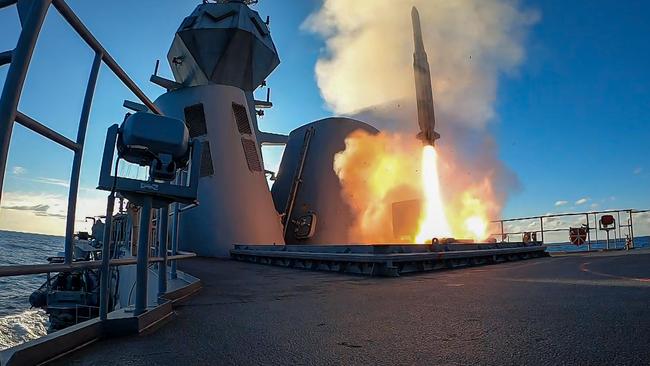Defence policy architect critical of Red Sea warship snub
The architect of Australia’s defence policy has described as a ‘national disgrace’ the federal government’s decision not to send a warship to the Red Sea.

The architect of Australia’s defence policy has described as a “national disgrace” the federal government’s decision not to send a warship to the Red Sea, saying the move contradicted the nation’s longstanding defence strategy.
Professor Paul Dibb is the author of the seminal 1986 Dibb Report, which enshrined the notion that Australia’s defence priorities lie in its immediate region, but he said the policy never excluded sending modest forces further afield to support global security.
“Defence Minister (Richard) Marles is manipulating the so-called defence of Australia doctrine and the primacy of our region of primary strategic concern as an excuse. It was never meant to exclude modest contributions to the joint Allied effort,” Professor Dibb said.

“He talks with abandon about protecting sea lines of communication elsewhere, but seems to ignore the fact that sea lines from the Persian Gulf through to the Red Sea and the Suez Canal are critical for oil supplies.”
The government refused a US navy request this week to send a warship to help protect sea lanes in the Red Sea from terror attacks, saying its naval priorities were in Australia’s immediate region.
The move, which reverses decades of tradition in responding positively to US alliance requests, has been criticised by the federal opposition and defence experts.
Opposition Leader Peter Dutton said the decision to reject the warship request and instead send just six ADF personnel to the Middle East “showed a special blend of weakness and incompetence” and was “a decision that could only be welcomed by Hamas”.
Professor Dibb said it was a “national disgrace” that the decision to refuse the US request occurred at the same time as the US congress passed legislation enabling the transfer of sensitive nuclear technology to enable Australia to acquire nuclear-powered submarines under the AUKUS pact.
“Only days after the US congress had agreed, with qualifications, to sell us three Virginia class SSNs, Canberra looks a gift horse in the mouth and says no to deploying a solitary warship into the Red Sea. This is not only highly embarrassing, it is a national disgrace,” Professor Dibb said.


Mr Marles hit back at Mr Dutton on Friday. “If you really look at what the leader of the opposition and the shadow minister are saying, they are essentially making an argument for Australia’s military commitments to return to the Middle East,“ he said. “And that demonstrates how utterly clueless they are about Australia’s national interest and where our strategic focus must be. Liberals always follow the politics. They never pursue defence policy.”
Mr Marles said Australia’s region was where its greatest “security anxiety” lay and where the bulk of its trade was. He said the US was “deeply appreciative” of the commitment of six ADF personnel to the new naval task force but did not say how the US responded to the rejection of the warship.
The US Navy asked Australia to contribute to a new 10-nation naval taskforce set up by US Defence Secretary Lloyd Austin to help protect commercial shipping in the Red Sea from growing missile and drone attacks by Iranian-backed Houthi rebels.
China’s state-run Global Times newspaper welcomed the government’s reluctance to send a warship to the Middle East and its decision to break with America in the UN on the conflict in Gaza as proof that Australia was shifting away from the US.
Mr Marles said a decision to send a warship to the Middle East would “fly in the face” of the Defence Strategic Review released in April, which emphasised the focus on Australia’s near-region.
However, the review also states “the defence of Australia’s national interests lies in the protection of our economic connection with the world and the maintenance of the global rules-based-order … accordingly the ADF must have the capacity to … protect Australia’s economic connection to our region and the world”.








To join the conversation, please log in. Don't have an account? Register
Join the conversation, you are commenting as Logout